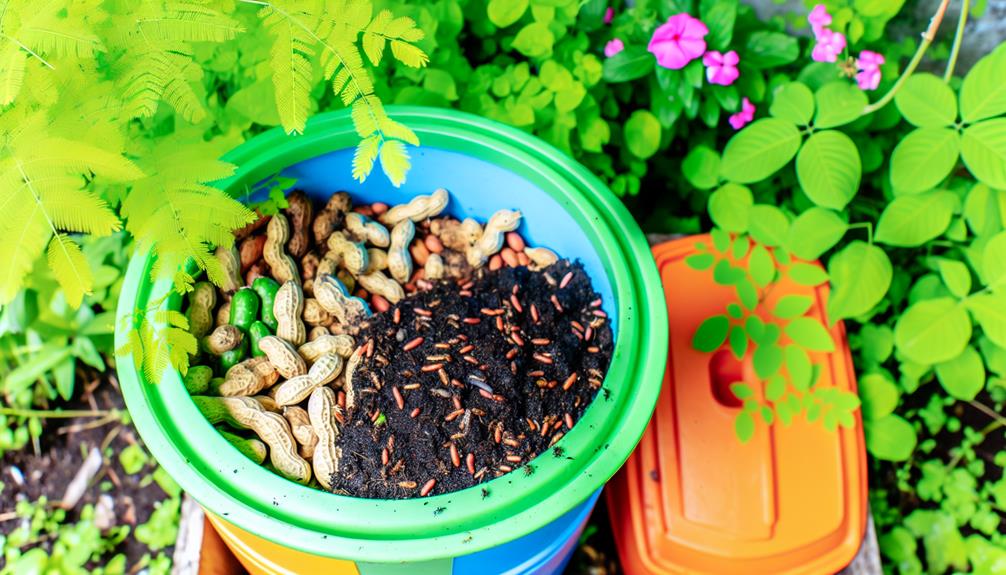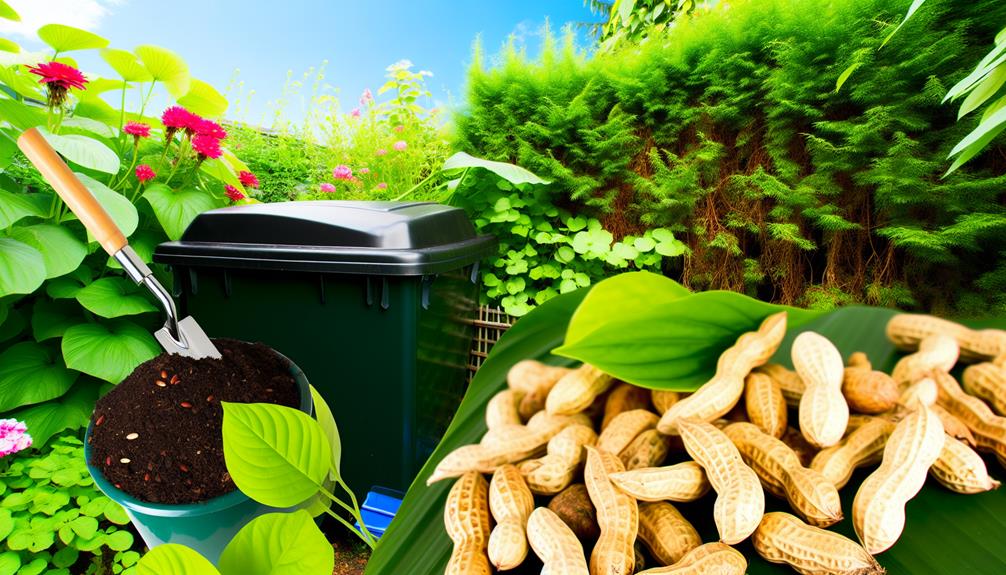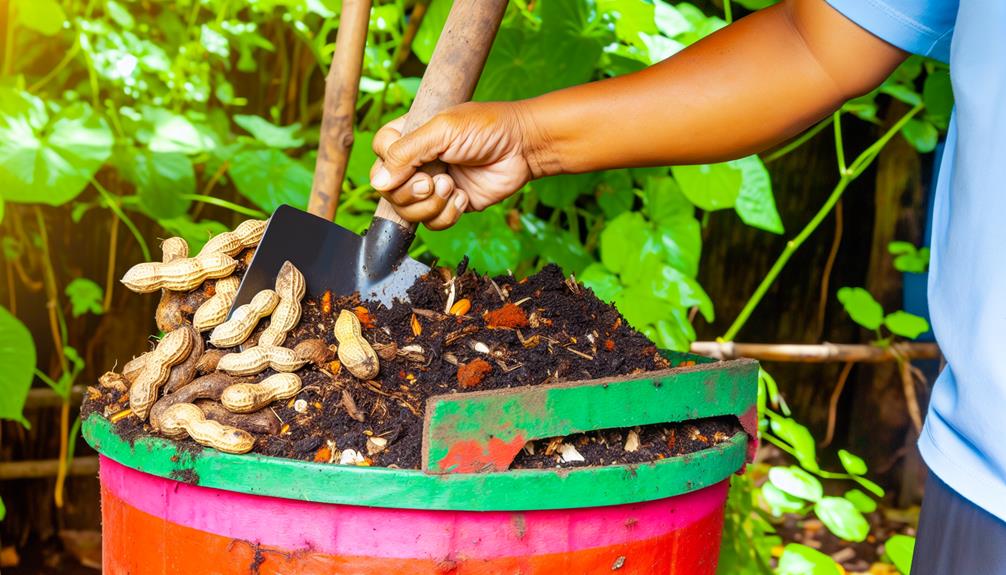

You can compost peanuts to enrich your soil and boost your garden’s health. Peanut shells, rich in carbon, improve airflow in your compost and decompose faster when broken into smaller pieces. Raw peanuts add essential nutrients and enhance soil fertility. Make sure to crush them before mixing with other compostable materials.
If dealing with salted peanuts, rinse and soak them first to remove the salt, then dry them completely. Maintaining a balance of green (nitrogen-rich) and brown (carbon-rich) materials is key, as well as regular turning and adjusting moisture levels. With these tips, your compost will thrive.
Composting peanuts can enrich your soil with essential nutrients, enhancing plant growth and health. When you compost peanuts, you’re engaging in nutrient recycling, taking what would otherwise be waste and transforming it into valuable soil enrichment. This process returns crucial elements to the earth, promoting a thriving garden ecosystem.
To begin, gather your peanut scraps and add them to your compost pile. Peanuts, rich in nitrogen, can boost the nutrient content of your compost. Make sure to balance them with carbon-rich materials like leaves or paper to maintain a healthy compost mix. This balance guarantees that the decomposition process runs smoothly, preventing any foul odors or pest issues.
Over time, the composting process will break down the peanuts, releasing nutrients that are easily absorbed by plants. This nutrient recycling not only reduces waste but also decreases the need for chemical fertilizers, which can harm the environment. By composting peanuts, you’re contributing to a sustainable gardening practice that benefits both your plants and the planet.
Alongside peanut scraps, peanut shells also offer great benefits when added to your compost pile. They’re rich in carbon, which helps maintain the important carbon balance in your compost.
To get the most out of peanut shells, break them into smaller pieces to speed up their decomposition rate. This will guarantee they integrate well with the other organic materials, creating a nutrient-rich compost.
Here are some key points to keep in mind when composting peanut shells:
Also Read: Can You Compost Butter?
Raw peanuts can be a great addition to your compost pile, adding valuable nutrients that enhance soil fertility. By incorporating raw peanuts, you contribute both a carbon source and essential nutrients, aiding overall soil enrichment. When you add raw peanuts to your compost, crush them slightly to increase the surface area for decomposition. This guarantees they break down more efficiently.

To achieve balanced compost, mix raw peanuts with other compostable materials like vegetable scraps, leaves, and grass clippings. The blend of green materials (high in nitrogen) and brown materials (high in carbon) creates an ideal environment for microbial activity. Raw peanuts fall into the brown category due to their carbon content, helping to balance the compost’s carbon-to-nitrogen ratio.
Remember to turn your compost regularly. This aerates the pile, promoting faster breakdown and reducing unwanted odors. It’s also important to maintain moisture levels; your compost should be as damp as a wrung-out sponge. If it’s too dry, the decomposition process will slow down.
Have you ever wondered if salted peanuts can go into your compost pile? The short answer is yes, but there’s a bit more to it.
Salted peanuts can lead to salt contamination in your compost, which isn’t great for your plants. To avoid this, you’ll need to focus on salt removal before adding them to your pile.
Here’s how you can do it:
Also Read: Can You Compost Cat Manure?
To achieve efficient composting, make sure you’re maintaining the right balance of green and brown materials. Green materials like vegetable scraps and coffee grounds provide nitrogen, while brown materials such as dry leaves and cardboard offer carbon. This balance is essential for a healthy compost pile.

Next, focus on compost aeration. Turn your compost regularly to introduce oxygen, which speeds up the decomposition process and prevents unpleasant odors. A well-aerated compost pile fosters beneficial microorganisms that break down organic matter more efficiently.
Maintaining moisture balance is equally vital. Your compost should be as damp as a wrung-out sponge. Too much moisture can lead to a soggy mess, encouraging harmful bacteria and slowing down decomposition. On the other hand, if it’s too dry, the composting process will stall. To adjust moisture, add water if it’s dry or incorporate more brown materials to absorb excess liquid.
Yes, composting peanuts can attract pests or rodents. To keep your compost safe, use pest deterrents and rodent repellents. Join a community of eco-friendly gardeners who share tips to maintain a healthy compost.
You’re wondering about environmental concerns with composting peanuts. Don’t worry, peanuts decompose at a good rate, enriching the soil without significant issues. Just make sure to balance your compost mix to maintain healthy decomposition.
You want to store peanuts in breathable storage containers to guarantee good air circulation. This prevents mold and helps maintain a healthy composting process. Join the community of eco-conscious folks who compost effectively and sustainably!
Yes, you can add boiled peanuts to compost. Their nutrient content benefits the pile, enhancing the decomposition process. Just make sure they’re broken down into smaller pieces so they integrate well, contributing to a thriving compost community.
When you compost peanuts, you might affect the compost acidity, but it’s unlikely to drastically alter the soil balance. Including diverse organic materials helps maintain a healthy compost and creates a sense of community in your garden.
To sum up, composting peanuts is entirely feasible and beneficial. Make sure to crush the peanut shells for faster decomposition and consider composting raw peanuts in moderation due to their oil content.
Salted peanuts should be rinsed to remove excess salt before adding them to your compost. Follow these tips for efficient composting, and you’ll enhance your compost quality while reducing waste.
Remember, proper balance and preparation are key to successful composting.
